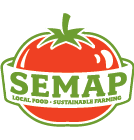The Southeastern Massachusetts Food Security Network today released its new report, the Southeastern Massachusetts Food System Assessment, which presents a wealth of baseline data on the many facets of the region’s food system.
Make sure to check out:
- The Infographic created by mediumstudio of New Bedford
- The Executive Summay
- The Full Assessment
Among the report’s findings:
- Southeastern Massachusetts has over 1700 farms and over 108,000 acres of land in farms, producing over $157 million in market value. However, the region’s residents still spend only $5.02 per person per year on direct market purchases of local foods.
- Nearly 1 in 5 children in Bristol County experiences food insecurity.
- In 2010, over $262 million in SNAP (food stamp) benefits flowed into the region, with major food security and economic multiplier benefits. However, 2014 cuts to SNAP in the Farm Bill could reduce benefits by up to $90 per month per household.
- The 12 food distributors headquartered in Southeastern Massachusetts generate total annual sales estimated at well over $2 billion.
- Nationally, 40% of food is wasted. In late 2014 Massachusetts will ban large institutions from sending food waste to landfills, which should provide an incentive for more edible food donations to local food pantries.
The goals of the Assessment, which covers Bristol, Norfolk, and Plymouth Counties, with some special focus on the cities of New Bedford and Fall River, are to:
- Provide the community with key baseline data on, and initial evaluation of, each element of the food system in Southeastern Massachusetts.
- Assess the potential for increasing both the production and consumption of local foods by residents of the region.
- Provide an initial identification of gaps, barriers, and needs.
In addition, the Assessment is intended to help connect Southeastern Massachusetts to current statewide and New England food system planning work, including the Massachusetts Food Plan, currently being carried out by the Metropolitan Area Planning Council (MAPC) and other partners on behalf of the Massachusetts Food Policy Council, and Food Solutions New England, a broad network connecting planning efforts in several states.
Organized according to the steps involved in bringing food from “farm to fork,” the Assessment includes chapters on food production, processing and distribution, and food access and consumption channels, as well as a chapter on “closing the loop” through food waste recovery and an overview of policy and regulatory issues affecting the region’s food system. Each chapter includes a section on “Gaps, Barriers, and Needs.”
